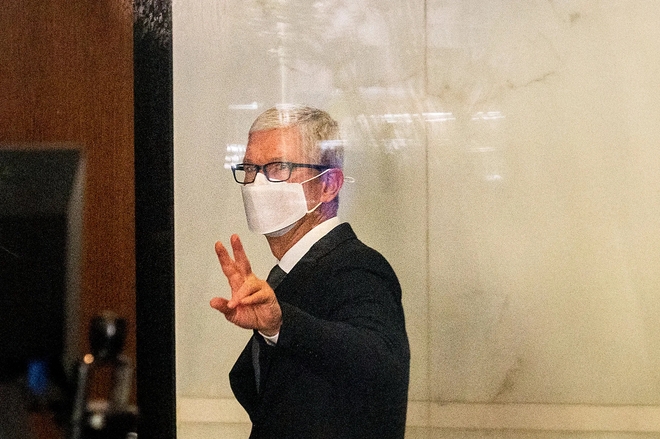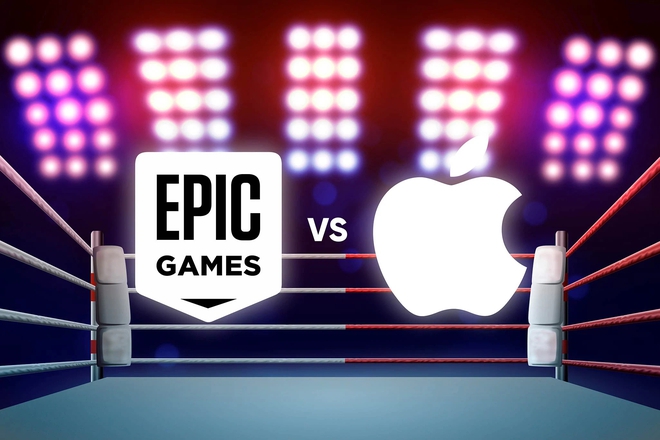Tim Cook plays an innocent role in the important testimony of the Epic lawsuit – Apple
- Tram Ho
But instead of harshly responding to Epic’s allegations and allegations, Tim Cook appeared calm, even intentionally naive, leaving many important questions related to the lawsuit left open or impossible to find out. answer.
This unexpected situation may not help create exciting news stories, but it is a tool to greatly reduce the “damage” of dangerous, but somewhat ambiguous, allegations, that Apple is abusing its monopoly on the App Store.
After being called out by Apple’s attorneys, Cook stood up and walked up to the podium. According to Law360 reporter Dorothy Atkins, one of two members of the media allowed to attend the trial, Epic CEO Tim Sweeney looks a bit strange right now.
” Cook just entered the courtroom. He wore a mask (against COVID), no mask, a dark gray suit, gray tie, and drank water from a steel pitcher in the hallway.
Sweeney sat at Epic’s consultation desk, looking down at his pen. His lawyer, Gary Bornstein, occasionally whispers in his ear. Cook seemed quite comfortable, sitting cross-legged. He just turned to the person sitting next to him, said something and then laughed. ”
The process of questioning Tim Cook by Apple’s own legal team went smoothly and revolved around the reasons why the App Store is a superior and complete platform for iOS users, and confirmed the presence of other competing app stores. He acknowledges that there are conflicts with developers, such as different priorities, or the need to improve app discovery, but says the company tries to keep feet of developers and users.

Image of Tim Cook at the previous trial in the Epic – Apple lawsuit
The innocent role began when he was asked about the numbers related to Apple’s R&D (research and development) – from 15-20 billion USD / year for the past 3 years. Specifically, he said that Apple can’t estimate how much money has gone into the App Store, because ” we don’t allocate money like that ” – in other words, research budgets for individual products don’t. separate from the rest.
Sounds unreasonable, doesn’t it? A company like Apple obviously has to know every penny they spend on the product and on the research process. Even if it’s not possible to split perfectly – what if an improvement in macOS code “eats” the money needed for an App Store feature? – then the company must know how their resources are being deployed and effectively. The differences between conservative and detailed estimates of the App Store’s R&D budget allocation can be huge, running into the hundreds of millions, but it’s almost certain that Apple has to do it within the company, rather than the company itself. publicly announced.
But because those numbers aren’t publicly available and detailed, and because they’re likely to be quite complex, Cook can honestly say it’s impossible to give a specific number like ” App R&D budget. ” Store is 500 million USD in 2019 “.
Not giving a “hard” number helps Apple eliminate the risk of being caught by Epic in a way: if the number is large, Apple is looking to protect the golden egg (ensure market power); if the number is small, Apple is looking to collect as many eggs as possible (collecting commissions through market power). The only move that helped Apple win was to stay out of the game, so Cook “played stupid” and as a result made Epic’s accusations look like baseless (and in Apple’s words) predictions. is “fantasy”).
Tim Cook then implemented a similar tactic, which was to “chill” the opponent with a preemptive statement of profit. He only mentioned total net sales, about $275 billion with a profit margin of 21%, that Apple doesn’t treat Apple’s earnings as a standalone business.
It could be argued that the App Store is a component that is very closely linked into a larger business structure. But to say it can’t be seen as a standalone business is odd. Again, it is almost certain that – like every division and every Apple product line – it will be segregated and reported internally in great detail. But like the R&D related data, when faced with legal cases, it is impossible to simply say that ” App Store earnings and profits are this and this “, thereby negating the fact that Epic launched.
However, the matter is of sufficient importance for Epic to consider it worthy of independent investigation. And among the first things Epic presented, when the right to testify was transferred to him, was an expert’s earlier testimony that the App Store’s profit margin on revenue was about 79%.
Apple obviously doesn’t want to confirm or deny these numbers, and Cook once again plays the naive role. However, the mask was slightly stretched when Epic’s attorney asked Cook to disclose the earnings numbers when combining the Mac and iOS App Store, which is classified as top secret. While Apple denied it, citing that it was confidential information and could only be revealed in a closed-door hearing, Cook said that the number for iOS is ” much larger ” than the figure for Mac.
What we see here is another financial ruse. By “mixing” income from iOS and Mac, Apple leads listeners into “muds”, not knowing how much money is generated and spent on them. Epic couldn’t break it down one by one, but the judge of the trial was no fool – she saw what Epic saw, but it was equally vague. Apple is trying to deny Epic’s legal victory, even if it makes them look shady and insidious.
That was even more evident when Cook was asked about Apple’s agreement with Google to keep the default search engine on iOS. Cook said he doesn’t remember the exact number.
If the CEO of one of the world’s biggest tech companies says he’s forgotten the details of a decade-long, multi-billion dollar deal with one of the world’s largest tech companies, other largest in the world, do you believe?

The remainder of the testimony did not shed any further light. Cook talks about the intricacies of doing business in regions like China, where the law heavily impacts technology and policy, and barely mentions the suggestion that Apple is looking to expand its deals. translate in the app and collect 30% commission from any transaction. Another testimony will be held at a closed-door hearing, but we won’t know more because it will cover a lot of top-secret information.
Overall, the trial between Epic and Apple contained few surprises; both sides made their statements from the outset, and largely relied on the judge’s understanding to interpret the matter. There are no unexpected witnesses or “shrewd” responses – it’s all just sublime arguments about what constitutes exclusivity. Apple insists there is fierce competition from Android, and in the gaming world, it also confronts Windows and consoles.
It’s almost certain that whatever the verdict is, the case will be appealed and taken to a higher court, but it will also reveal Epic’s arguments (and Apple’s shady tricks). ) is perceived. Either way, Epic and other companies that have criticized Apple’s App Store charges have hit their mark. Apple’s lowering of the fee for the first $1 million earnings to 15% was clearly intended to reassure developers and prevent attacks from the press, and now Apple is having to explain how they made that decision.
Humiliating Apple is obviously the last thing Epic wants, and whether they win or lose, Epic is probably satisfied because their money has been spent on things it deserves.
Reference: TechCrunch
Source : Genk
